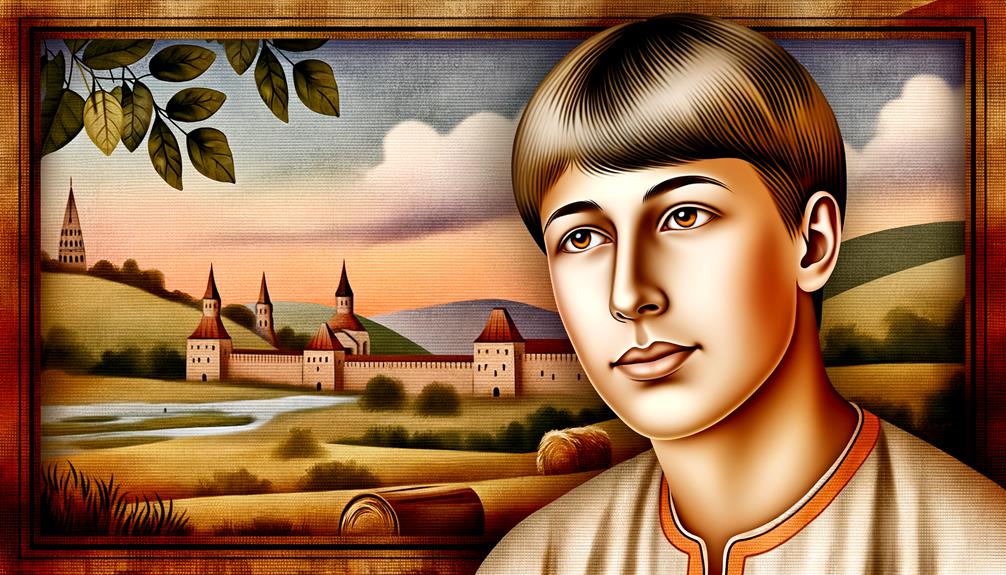Ivan Name Meaning in English
The name Ivan, tracing its etymological roots to Slavic languages, derives from the Greek Ioannes and Hebrew Yochanan, signifying 'God is gracious.' This name bears profound historical and cultural weight, prominently reflected in Eastern European contexts, especially Russia and Bulgaria. Ecclesiastical origins and royal associations, with figures like Ivan the Terrible, underscore its historical resonance.
Ivan's versatility is further highlighted by its variations across different languages, such as Ivo, Jan, and Ioan. Its sustained global appeal is anchored in its robust phonetic structure and traditional connotations, promising continued relevance in future naming trends.
Discover more layers of Ivan's historical legacy.

Key Takeaways
- Ivan means 'God is gracious,' originating from the Hebrew name Yochanan.
- The name Ivan is derived from the Greek name Ioannes.
- Ivan is a popular name in Eastern Europe, especially in Russia and Bulgaria.
- Historical significance includes usage among royalty and saints, notably Ivan the Terrible.
- Ivan's modern appeal is due to its phonetic simplicity and cultural resonance.
Origin of the Name Ivan
The name Ivan originates from the Slavic languages and is derived from the Greek name Ioannes, which in turn traces its roots to the Hebrew name Yochanan, meaning 'God is gracious.' This etymological progression showcases a fascinating linguistic migration from Hebrew to Greek, then to the Slavic tongues.
Ioannes, a prominent name in early Christian texts, was adapted by Slavic cultures, morphing phonologically into Ivan. Such transformations illustrate the fluid nature of language and cultural exchange. The orthographic shift from Ioannes to Ivan exemplifies common phonetic evolutions: the Greek 'Ioa' evolving into a simpler 'Iva' sound structure.
This historical and linguistic journey underscores how names evolve, adapting to phonetic and cultural contexts over centuries.
Meaning of Ivan
The name Ivan, with its roots in Slavic etymology, originates from the Greek name Ioannes, which itself is derived from the Hebrew Yohanan, meaning 'God is gracious.'
Historically, Ivan has held significant cultural weight across Eastern Europe, particularly in Russia, where it has been borne by numerous rulers and saints.
In contemporary contexts, the name Ivan embodies a blend of traditional reverence and modern versatility, reflecting its enduring legacy.
Slavic Origins Explained
Derived from the Old Slavic name 'Ioan,' Ivan is etymologically rooted in the Greek name 'Iōannēs,' which itself originates from the Hebrew name 'Yohanan,' meaning 'God is gracious.' This transference of names across linguistic and cultural boundaries illustrates the fluidity of nomenclature in historical contexts.
The table below elucidates the etymological progression and linguistic shifts:
| Language | Name |
|---|---|
| Hebrew | Yohanan |
| Greek | Iōannēs |
| Old Slavic | Ioan |
| Modern Slavic | Ivan |
| English | John |
This table demonstrates the diachronic evolution of the name, highlighting its adaptability and enduring significance. Ivan's Slavic origins underscore its profound cultural resonance, reflecting a deep-seated tradition of naming conventions grounded in religious and historical significance.
Historical Significance Unveiled
Frequently analyzed within historical texts, the name Ivan encapsulates a rich tapestry of cultural and religious significance that has permeated various epochs and societies.
Originating from the Hebrew name Yohanan, meaning 'God is gracious,' Ivan was adopted into the Slavic lexicon through Byzantine influences. The name gained prominence in Eastern Europe, particularly in Russia and Bulgaria, where it became synonymous with royalty and leadership. Historical figures such as Ivan the Terrible underscore its regal connotations.
Additionally, the name's ecclesiastical roots are evident in its frequent use among saints and clerics, reinforcing its spiritual gravitas. Hence, Ivan's historical significance is multifaceted, intertwining etymological evolution with sociopolitical and religious dimensions.
Modern Interpretations Analyzed
In contemporary contexts, the name Ivan retains its traditional connotations of divine grace while also reflecting modern cultural and linguistic adaptations. Etymologically rooted in the Hebrew name Yohanan, meaning 'God is gracious,' Ivan has traversed various linguistic landscapes, particularly Slavic nations, to become widely recognized.
Modern interpretations often emphasize its robust and resilient phonetic structure, which contributes to its enduring popularity. The name Ivan is frequently associated with notable historical figures, imbuing it with a sense of gravitas and timelessness. Its usage in various media and literature continues to reinforce its cultural resonance.
As a result, Ivan embodies a synthesis of historical reverence and contemporary significance, maintaining its relevance across generations and cultures.
Historical Significance
The name Ivan holds substantial historical significance, particularly within the context of royalty, as evidenced by its frequent association with prominent Russian rulers such as Ivan the Terrible.
Etymologically derived from the Hebrew name Yohanan, meaning 'God is gracious,' Ivan has persisted through centuries, maintaining its relevance across various cultures and epochs.
Its enduring usage underscores a complex interplay between linguistic evolution and sociopolitical factors.
Ivan's Royalty Connections
Throughout history, the name Ivan has been borne by numerous monarchs and nobility, particularly within Slavic countries, underscoring its profound regal connotations and etymological importance. The name Ivan, derived from the Hebrew Yohanan, meaning "God is gracious," has been a popular choice among Eastern European royalty. Below is a table illustrating notable royal figures named Ivan, their titles, and their respective countries:
| Name | Title | Country |
|---|---|---|
| Ivan IV | Tsar | Russia |
| Ivan III | Grand Prince | Russia |
| Ivan Asen I | Tsar | Bulgaria |
| Ivan Vladislav | Tsar | Bulgaria |
| Ivan Stephen | Tsar | Bulgaria |
These figures have contributed significantly to the historical and cultural landscape, further solidifying the name's noble heritage.
Ivan Across Centuries
Examining the historical significance of the name Ivan reveals a profound continuity of influence across centuries, marked by its persistent etymological roots and its enduring presence in diverse cultural and political contexts.
Originating from the Hebrew name Yohanan, meaning 'God is gracious,' Ivan has traversed through time, retaining its essence while adapting to Slavic linguistic frameworks. It became particularly prominent in Eastern Europe, with notable figures such as Ivan the Terrible, the first Tsar of Russia, exemplifying its royal and authoritative connotations.
Additionally, the name's diffusion into literature and folklore underscores its cultural permeation. This historical trajectory elucidates Ivan's resilient adaptability and its sustained relevance in shaping identities across generations and geographies.
Ivan in Literature
Numerous literary works across diverse cultures have featured the name Ivan, often imbuing it with deep symbolic significance and reflecting various etymological roots. The literary portrayal of Ivan is rich and multifaceted, often symbolizing strength, resilience, and complexity. For instance, Fyodor Dostoevsky's "The Brothers Karamazov" features Ivan Karamazov, a character embodying intellectual skepticism and moral ambiguity. Similarly, in Russian folklore, Ivan the Fool represents a quintessential archetype, illustrating both simplicity and wisdom.
| Literary Work | Character Name |
|---|---|
| "The Brothers Karamazov" | Ivan Karamazov |
| Russian Folklore | Ivan the Fool |
| "One Day in the Life of Ivan Denisovich" | Ivan Denisovich |
| "War and Peace" | Ivan Ilyich |
| "Ivanhoe" | Ivanhoe |
These portrayals underscore Ivan's diverse etymological and cultural dimensions.
Famous Ivans in History
The name Ivan has been borne by a multitude of influential historical figures, each contributing to the name's enduring legacy and multifaceted significance.
Ivan IV Vasilyevich, also known as Ivan the Terrible, was the first Tsar of Russia, whose reign marked a pivotal era in Russian history through centralization of power and territorial expansion.
Ivan Pavlov, a distinguished physiologist, made groundbreaking contributions to behavioral psychology with his research on conditioned reflexes.
Ivan Aivazovsky, a preeminent painter, is celebrated for his masterful seascapes which have left an indelible mark on marine art.
These individuals exemplify the diverse arenas—ranging from governance and science to art—where bearers of the name Ivan have left an indelible imprint on history.
Cultural Variations
Beyond the notable historical figures, the name Ivan exhibits intriguing cultural variations that reflect its etymological roots and adaptation across different linguistic and cultural landscapes.
Originating from the Slavic form of John, Ivan is derived from the Hebrew name Yohanan, meaning 'God is gracious.' In Russian and Bulgarian, Ivan remains prevalent, illustrating its Orthodox Christian heritage. In Croatian, the name morphs into Ivo, while in Polish, it translates to Jan.
Variants like Ioan in Romanian and Euan in Scottish Gaelic demonstrate its widespread adoption. These variations underscore Ivan's linguistic fluidity and cultural significance, revealing a name that transcends its origins to find resonance in diverse global communities.
This etymological journey highlights the name's adaptability and enduring appeal.
Popularity Over Time
Tracing the name Ivan's popularity over time reveals a complex interplay of historical events, cultural shifts, and linguistic evolution that has influenced its prevalence in various regions.
Originating from the Slavic form of John, Ivan has seen fluctuating popularity driven by geopolitical factors and cultural integration.
Key elements include:
- Medieval Usage: Popular among Eastern European royalty and clergy, enhancing its status.
- Orthodox Christianity: Ivan's association with saints and religious figures bolstered its use.
- Russian Influence: The name gained prominence through notable Russian leaders like Ivan the Terrible.
- Immigration Waves: Migration patterns spread Ivan to new territories, particularly in the 19th and 20th centuries.
- Modern Trends: Contemporary use reflects a blend of traditional reverence and global cultural exchange.
These factors collectively illustrate the dynamic journey of Ivan's popularity.
Ivan in Modern Culture
Ivan's presence in modern culture is emblematic of its enduring resonance, permeating various facets of contemporary society including media, literature, and global naming trends. The name Ivan, with its Slavic roots and etymological connection to John, manifests a cross-cultural versatility that appeals to diverse demographics. Its frequent appearance in contemporary literature and cinema underscores its narrative potency and timeless appeal.
| Domain | Example |
|---|---|
| Literature | "Ivanhoe" by Walter Scott |
| Film | "Ivan Vasilievich: Back to the Future" |
| Television | "Ivan the Terrible" series |
| Music | Ivan Dorn, Ukrainian singer |
| Gaming | "Ivan" in "Golden Sun" |
This table illustrates the multifaceted application of Ivan in various cultural domains.
Naming Trends and Future
The name Ivan, rooted in Slavic tradition and etymologically derived from the Hebrew name Yohanan, has consistently demonstrated a remarkable adaptability and persistence in naming trends across various cultures and epochs. Its continued relevance can be attributed to its simplicity, phonetic appeal, and historical significance.
In forecasting naming trends, Ivan is positioned to maintain its popularity due to several factors including:
- Globalization: Increased cultural exchange promotes cross-cultural names.
- Historical Resonance: Deep historical roots enhance its timelessness.
- Phonetic Simplicity: Easy pronunciation across languages.
- Cultural Representation: Association with influential figures and literature.
- Versatility: Adaptable to various linguistic and cultural contexts.
These factors collectively guarantee Ivan's enduring appeal in the ever-evolving landscape of names.
Conclusion
In summation, the name Ivan, with its Slavic origins and meaning rooted in 'God is gracious,' has traversed centuries of historical and cultural landscapes. From its literary depictions to notable historical figures, the name has maintained a significant presence.
As the adage goes, 'A name is a mirror of the soul,' reflecting the enduring legacy and evolving popularity of Ivan. This analysis underscores the name's multifaceted significance and anticipates its continued relevance in future naming trends.






